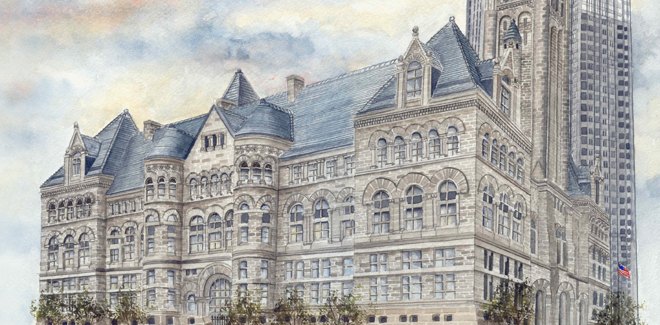The Allegheny County Law Library (ACLL) is a public law library, serving the Allegheny County residents. The ACLL is not part of the Carnegie Library of Pittsburgh or the eiNetwork.
How to access the Allegheny County Law Library remotely
414 Grant Street, 9th Floor
Pittsburgh, PA
The Allegheny County Law Library (ACLL) also offers these services for a small fee, as detailed in Guide to ACLL Services for the Public.
When it comes to services for the Bench, law libraries need to think about serving the public in need of Court Services absent legal representation. The Allegheny County Law Library strives to provide such services, understanding that privacy is paramount.
Pro Se Litigants are helped at ACLL in many ways, including:
1. find relevant resources by searching the ACLL's online catalog, or the Pro-Se Litigants Resource Page.
2. use the public terminals for your work;
3. make copies of those resources;
4. find directions for locating needed services in offices located in the City-County building, or outside.
Remember to research the law by using ACLL's LibGuides; and watching our videos. Watch our videos to learn how to access our resources - in person or remotely.
If you need additional assistance in research, you can visit the ACLL at acllib.org, call us at 412-350-5353 or email us at ACLL@duq.edu.
Courthouses are important places to look for
These are usually found in the Register of Wills office in each county. For instance, in Allegheny County, the Department of Court Records, Wills/Orphans’ Court Division accepts documents for the Orphan's Court, and issues marriage licenses and takes passport applications.
Records in the Recorder of Deeds offices can also be useful. Here is the Allegheny County Recorder of Deeds.
Naturalization records are usually held by the Prothonotary's Office in each county; for Allegheny County information, click here.
If you visit the Pennsylvania Courts of Common Pleas website you will find a map of all county courthouses in Pennsylvania, as well as information on county prothonotaries and registers of wills. Access a listing of recorders of deeds in Pennsylvania.
Here is a the map for the Allegheny County Common Pleas Court.

Policy & Forms from the Federal Bureau of Prisons: https://www.bop.gov/resources/policy_and_forms.jsp
Resources from Pennsylvania Department of Corrections
Other Resources
Resources for the formerly incarcerated from the Federal Bureau of Prisons: https://www.bop.gov/resources/former_inmate_resources.jsp
This directory of prison libraries is maintained by the Washington State Library Institutional Library Staff. This is the Pennsylvania entry.
Maps and lists of the institutions, regional offices, a headquarters, staff training centers, and residential reentry management offices administered by the Federal Bureau of Prisons. The Bureau also administers contracts with private corporations to operate additional correctional institutions.
Law Libraries Serving Prisoners is an online version of the print "Directory: Law Libraries Offering Services to Prisoners." The American Association of Law Libraries (AALL), Social Responsibilities Special Interest Section, Standing Committee on Law Library Services to Prisoners compiles the data.
WorldCat list of books tagged by ALA Library staff as key references for prison library management.
Corrections-related resources including training plans, research reports, program evaluations and more. Not all items are online. Access to the full collection and onsite Information Experts, through online Information Help Desk. Catalog searchable and browsable.
If you have feedback, questions or suggestions about this guide, please contact the Allegheny County Law Library at acll@carnegielibrary.org.
This guide was last updated on August 2, 2022.